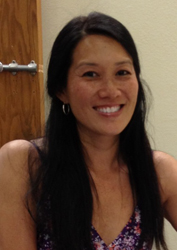Professor Jennifer Warren’s ‘Communication and Social Change’ class spent the semester doing research for a state program to combat obesity
When state officials called professor Jennifer Warren to help with a federally funded program to combat obesity in New Jersey, she saw it as a teachable moment.
Instead of working alone with ShapingNJ - a public private partnership in the Department of Health and Senior Services' Office of Nutrition and Fitness - to identify some of the barriers to healthy living, Warren turned the project into a class assignment.
Students in “Communication and Social Change” spent the spring semester talking to a hospital, a day care center, a high school, a local YMCA and Rutgers Dining Services about innovative ways to promote healthy eating.
The students submitted suggestions that included creating a smart phone application to post calorie and nutrition content of food in campus dining halls and replicating a program in a Hunterdon County high school that incorporates sports and games into the school day.
The class turned its findings over to ShapingNJ, a four-year-old movement funded by the Centers for Disease Control and Prevention. ShapingNJ collaborates with more than 200 organizations to reach employers, schools, child care centers, local communities, and hospitals to make healthy food and exercise more accessible.
The state is reviewing the student reports for ideas that its partners can use to combat obesity.
Throughout the semester students worked directly with decision makers, tried to influence change, and learned how to shift gears when their research took them in an unexpected direction.
“You talk about community engagement, you can’t be anymore engaged than that,’’ said Warren, an assistant professor of health communication in the School of Communication and Information. “It is a great simulation for what students have to do if they are going to go out and get a job.’’

Warren also saw the ShapingNJ partnership as a chance for soon to be graduates to network, as well as an opportunity “to work on an issue that has relevance to society at this moment and time.’’
The experience inspired students to want to change their own communities while giving them a glimpse of working outside the classroom.
Terrell Blount, who is majoring in both in communication and Africana studies, said Warren taught him that change can happen if a community demands it.
“If we don’t tell the policy makers this is what we want, this is what we need, they are not going to do it,’’ Blount said. “That is what I learned about standing up and speaking out. We all may think the same thing but you need one or two people to galvanize the fight.’’
His involvement in the class also got Blount thinking about bringing change to the Newark neighborhood where he grew up so there will be “fewer McDonald’s on every corner and more gyms and organic food stores.’’
“I don’t see any Whole Foods, any Trader Joe’s where I live,’’ Blount said. “People in my neighborhood don’t know about it. I feel like I should start teaching people in my community so they will want better than they are getting.’’
June Durr, who returned to school to finish her degree after having a family, interviewed administrators at Hunterdon Central Regional High School. Students in her group discovered that the high school offered organized games and sports during an extended lunch period. The activities give students who might not have gym classes that semester a chance to exercise during the school day. A school wellness committee also works to promotes healthy living and activities.
“We went in there thinking there was an issue that needed to be addressed, but the way it took shape was totally different,’’ Durr said.

“I have never seen in any other class that you go out in the field and that is the main focus,’’ Durr said. “I think it has a lot more value because you can see the actual real world experience.’’
For ShapingNJ, teaming up with Rutgers students was a chance to get some fresh perspective, said Peri Nearon, director of the state Office of Nutrition and Fitness, who holds a master’ degree in public administration from Rutgers-Newark.
Nearon described ShapingNJ as a movement that aims to bring about a social shift – similar to the type of change that has made wearing seatbelts a reflex and smoking indoor unacceptable.
“It is about trying to create social change so the healthy option becomes more of the norm,’’ Nearon said. “Right now it’s the opposite. We drive through McDonald’s, we go to the ballgame and there is nothing healthy to eat. People in cities don’t think there is a safe place for kids to play and get exercise.’’
The students’ involvement with ShapingNJ “heightened their awareness of the entire issue,’’ Nearon said. “Students were learning as they went out and did the work for their projects. They worked on a real problem for a real initiative. It seemed like it had a piece that would be more interesting to students – if I were a student I would be thinking ‘this is real.’’’
Chris Gorga, a senior, agreed that the appeal of the class was getting hands-on experience and doing work that resonated beyond the university.
“It was the best class I have ever taken because I was forced to do something I didn’t know how to and I had to learn on the job,’’ said Gorga, of Closter. “This is what is going to be asked of you when you leave school."